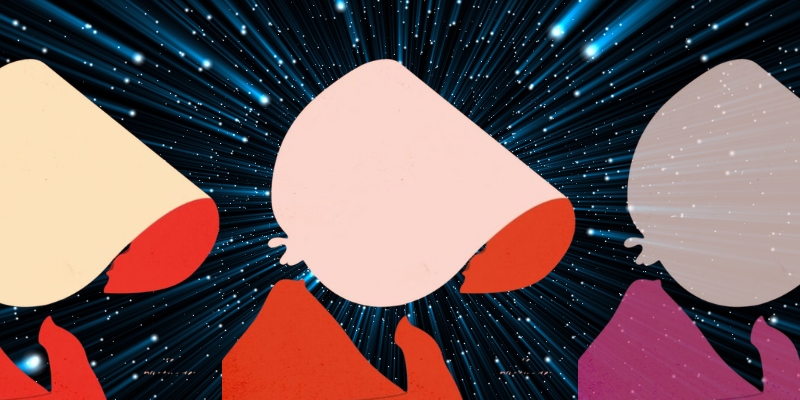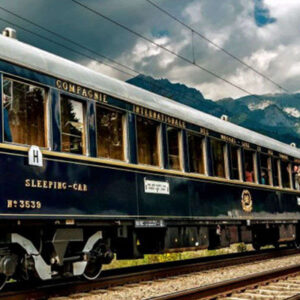I can’t help it. I’m drawn to tales of women defying a world that’s trying so hard to keep them playing small. Even better if those tales use some element of the speculative to better illuminate our society’s gender inequities, and how often that rigged status quo repeats itself.
(But grounded speculative, where it’s a version of our world where the weird is occurring, because our society and where it’s taking us I find much more frightening than any amount of horror taking place on some distant fictional planet.)
Feminist speculative fiction, that’s my sweet spot—and the reason behind many of the choices I made in conceiving my debut novel, The Once and Future Me.
It’s a psychological thriller that takes place in 1954, about a woman who wakes on a patient transport bus arriving at a Virginia state mental hospital with no memory, just a menacing little voice in her head she tells no one about, convinced she couldn’t possibly be the delusional schizophrenic doctors say she is.
But when disturbing visions of the future begin filtering into her reality, she can no longer be certain of sanity and must make a choice, submit to a brutal experimental treatment promising relief from her symptoms and freedom, or trust that scary voice in her head and risk all to learn if she’s truly the unhinged housewife everyone believes her to be—or something else entirely.
At its heart it’s about a woman who finds herself in a situation so many women have: of being told they’re acting crazy or difficult by the “adults” (mostly men) in the room. A familiar and age-old experience, but the speculative backdrop allowed me to tell the story in a unique and heightened way like the incredible novels I’ve listed below.
There are so many feminist speculative works I revere, but these are the ones that most personally inspired, influenced or just plain kept me going on the long, challenging road to getting my book out into the world.
*

Margaret Atwood, The Handmaid’s Tale
A cornerstone of feminist speculative fiction, this book is even more chilling to me now, in these times we find ourselves living in, than it was the day it was published. It takes place in a dystopian future where a totalitarian regime called Gilead has overthrown the United States in response to a global fertility crisis and fertile women called Handmaids are forced to bear children for the ruling class.
Told through the eyes of Offred, a Handmaid, the novel explores the themes of female oppression, loss of individual freedom, and resistance against a religious extremist government, and is a warning about the fragility of democracy.
When I first heard about this book way back in the fall of 1985, I had to have it, but I was earning verrrry little as an editorial assistant at Elle, so I put it on my Christmas list. Yes, I still gave my mother a Christmas list at age twenty-three. Shut up! Mom came through and I still have that first edition with its incredible cover!
This book did not disappoint. It grabbed me by the throat and literally changed how I saw the world, got me to listen for the signs and sounds of the patriarchal power structure still quietly humming away behind the scenes of my 1980s world, pulling the levers and running our society.
Most of all The Handmaid’s Tale made me realize how easily the rights I took for granted could slip away, step by step, if we don’t stay vigilant and loud. Though I read it long before I ever imagined writing a book of my own, it deposited itself in my brain and waited….

Naomi Alderman, The Power
The Power explores what might happen to society and the balance of gender power if women were suddenly able to discharge electricity from their hands, giving them the power to injure or kill at will. I was deeply mired in my weird genre-straddling debut novel’s first draft and having serious doubts about its future, when The Power came out.
It absolutely re-energized me, made me see anew, the power—sorry for the pun—of using an alternate version of the world to illuminate the gender issues of our own.

Kelly Barnhill, When Women Were Dragons
Packed with beautiful prose, it’s an alternative history tale where maligned and mistreated women transform into dragons in the “mass dragoning event” of 1955, and society does its best to pretend the whole thing never happened.
A wild setup that lets Barnhill explore gender, agency and censorship in a society that’s trying desperately to keep women in their lane, and she’s a master at engaging her readers’ latent…or not so latent rage to pull them into her incredible story.

Sarah Gailey, The Echo Wife
Tells the story of Evelyn, an accomplished cloning researcher, who discovers her husband has used her technology to clone a more docile, supportive version of his wife. When the clone kills the husband in self-defense, Evelyn, who, after all, shares the same DNA with this ultimate trad wife, is forced to help her cover-up the murder.
Gailey’s use of sci-fi in this domestic thriller allows her to explore the ideas of gender roles, sacrifice, female identity shaped by a man’s desires, and manipulation within a marriage, all while creeping—and entertaining—the hell out of us.

Octavia Butler, Kindred
The story of Dana, a black woman from 1976 who finds herself being pulled back in time, again and again, to antebellum Maryland to save the life of her abusive white ancestor, Rufus, so that she and the rest of his descendants don’t flicker out of existence.
A book Butler called “a kind of grim fantasy,” where she “set out to make people feel history,” Kindred shines a light on the power dynamics of antebellum slavery, in particular, the brutal calculations and choices it forced its female victims to make in order to survive.
All of this is seen through Dana’s twentieth-century eyes and sensibility, making for a gut-wrenching experience as she’s compelled to make increasingly painful compromises to her autonomy in order to preserve her bloodline and stay alive long enough to get back to her own time.
By the end of the book, Butler has redefined heroism in terms of persistence, survival and escape, and enduring as the ultimate denial of victimization. And if that weren’t enough, Butler’s dialogue just moves, and her prose is so lyrical, I like to dip into it from time to time, like a warm bath of inspiration.
*
Like The Once and Future Me, these powerful works use the fantastic to reveal the darkest corners of our own world—so that horrified, enlightened and angry, we might fight that much harder to fix it—and ourselves.
Remember, always be agitating. 😊
***


















